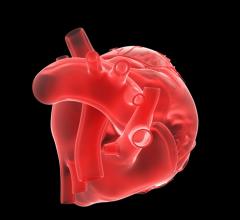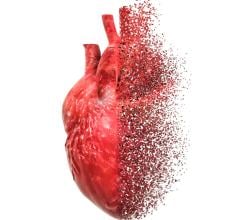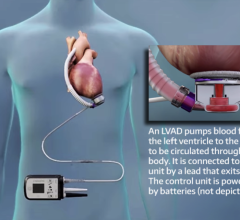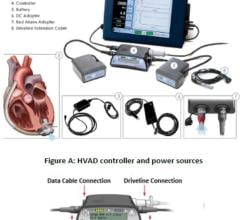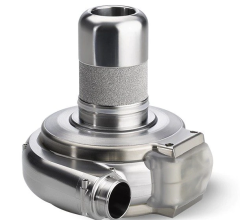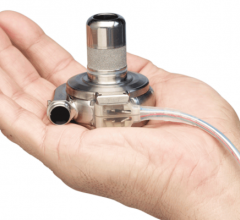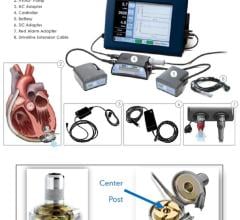March 29, 2007 — Data released from the bridge-to-transplantation (BTT) arm of the HeartMate II Pivotal trial demonstrate that the device provides effective mechanical circulatory support as a bridge to transplantation for heart failure patients, and that these patients experience a lower number of adverse events and an improved quality of life while being supported by the device.
The data were presented at a late breaking clinical trial session of the 2007 American College of Cardiology Scientific Sessions by Dr. Leslie Miller of Washington Hospital Medical Center/Georgetown University on behalf of the HeartMate II investigators. A video of Dr. Miller's presentation of the trial data can be found under the investor relations section of Thoratec's Web site at http://www.thoratec.com.
The trial involved 133 patients enrolled at 26 centers from March 2005 through May 2006, and the data reported reflect patient follow-up through the end of December 2006. Thoratec completed its PreMarket Approval (PMA) filing seeking approval for the BTT indication at the end of 2006.
Dr. Miller reported that 100 patients, or 75 percent of the cohort, met the trial's primary endpoint, which was cardiac transplantation or survival at 180 days while remaining eligible for transplantation. The data also showed that the trial met or exceeded the objectives for the secondary endpoints, including frequency of adverse events, improved functional status and enhanced quality of life.
"The outcomes of this study demonstrate that the HeartMate II not only provides reliable, long-term circulatory support, but also improves the quality of life for these patients," Dr. Miller said. "As the first continuous flow circulatory support device to complete a U.S. trial, we are pleased with the outcomes and look forward to completing the other arm of the study that involves a larger cohort of patients who are not eligible for transplantation," he added.
The mean support duration for patients in the BTT trial was 169 days, with one patient supported by the device for 600 days, or 20 months. The patients ranged in age from 18 to 69 years of age.
Other key findings of the trial data included:
-- 51 percent, or 68 of the trial patients, were transplanted and three
additional patients recovered sufficient function of their natural
heart to have the device removed.
-- 22 percent, or 29 of the trial patients, were being supported by the
device at 180 days or longer and still eligible for transplantation.
-- 25 percent, or 33 of the patients, did not meet the primary endpoint,
including 25 who died while being supported on the device. There were
no reported mechanical pump failures.
-- The level of adverse events in major categories was lower than that
reported in previous trials with pulsatile devices. There were no
pocket infections and only 18 percutaneous lead infections. When
compared to the results of the previous BTT trial for the HeartMate VE,
the rate of percutaneous lead infection events declined by
approximately 90 percent, and the incidence of bleeding requiring
follow up surgery was reduced by approximately 40 percent. The event
rate for stroke declined by more than 50 percent, while the rate of
non-stroke neurological events declined by approximately 60 percent.
"We are delighted with the data presented today and what the outcomes represent for the many patients suffering from advanced-stage heart failure and the clinicians treating them," said Gary F. Burbach, president and chief executive officer of Thoratec. "Beyond the improvement in hemodynamic support and lower rates of adverse events, what is particularly compelling about the study data is that by a number of measures the patients' quality of life improved dramatically while being supported by the HeartMate II," Burbach noted.
"All of these patients entered the trial as New York Heart Association Class IV patients, the most severe level of heart failure. Within three and six months, 72 percent and 82 percent of them, respectively, were NYHA Class I or II, representing a dramatic improvement in their ability to resume a number of normal activities. For example, the average distance covered in a six-minute walk improved 4.5 fold after a month of support, and there were seven-fold and eight-fold improvements at three and six months, respectively. We look forward to the subsequent release of additional data from this arm of the trial, including the Continued Access Protocol (CAP) patients, completing enrollment in the Destination Therapy (DT) arm of the trial and the approval and commercial launch of the HeartMate II for BTT," he added.
Enrollment of BTT patients continues in the study under a CAP. As of January 26, the company had enrolled 250 bridge patients. In addition, 253 patients had been enrolled in the DT arm of the trial.
The HeartMate II, which has a CE mark allowing for its commercial sale in Europe, is a continuous flow device designed to provide long-term cardiac support for advanced-stage heart failure patients. An implantable LVAS (Left Ventricular Assist System) powered by a rotary pumping mechanism, it is significantly smaller than devices currently having PMA approval, enabling an easier implantation in a broader population of patients. The HeartMate II is designed to have a much longer functional life than other approved devices and to operate more simply and quietly. The device pumps blood through the circulatory system on a continuous basis with only one moving part.


 June 19, 2024
June 19, 2024 
